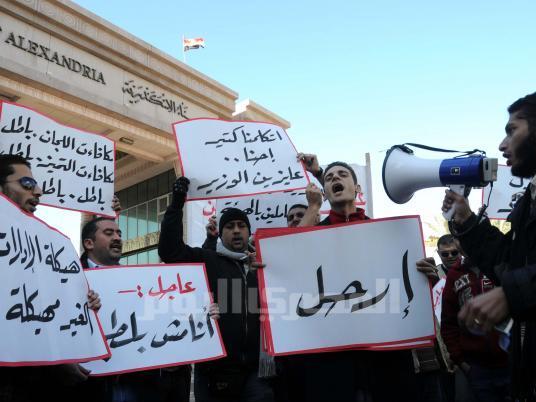
Cairo and Alexandria witnessed a fresh wave of strikes and protests on Sunday, blocking roads and causing disruption to the work of the Ministry of Transport.
In the Cairo district of Nasr City, truck drivers blocked the entrance to the Ministry of Transport offices in protest at statements by Minister Galal al-Sayed, in which he urged drivers to obey a traffic safety law adopted by the Interior Ministry. The truck drivers view the new rules as unfairly burdensome.
Sayed moved temporarily to the cabinet building on Qasr al-Aini Street in downtown Cairo. Army and police forces are negotiating with the protesters to end their sit-in and re-open the Nasr Road to traffic.
Mahmoud Ezz Eddin, the head of the General Authority for Roads, Bridges, and Land Transport, told Al-Masry Al-Youm that the Transport Ministry had collaborated with the Interior Ministry to set traffic regulations for truck drivers in order to protect car drivers. The rules include sticking to roads with widths of more than 3.20 meters, a rule that some truck drivers considered unfair.
He said that the width of some large trucks is only slightly less than the width of roads, a phenomenon that hinders traffic and leads to accidents. He said that the authority, as a concession, has agreed to renew drivers’ licenses for free, instead of charging the LE550 fee typically required.
“The drivers want to be free to drive at any time and any place, which is unacceptable, as it could cause more accidents,” he said.
Meanwhile, dozens of academics and post-graduate researchers began a sit-in on Sunday at the General Investment Authority, also in Nasr City, where Prime Minister Kamal al-Ganzoury holds his ministerial meetings. The protesters are demanding appointments to research centers and universities, and have called a halt to the system of "job bequeathals."
They blame college deans, university presidents and researchers for the crisis, which they say continues despite job vacancies. The protesters blocked traffic on Salah Salem Street.
The demonstrators have formed a coalition to submit their demands to the government. During 2011, they staged a 100-day sit-in at the Ministry of Scientific Research in Cairo.
At Cairo Railway Station, nearly 350 dismissed railway workers blocked the railroads to demand not only that their jobs be returned, but that they receive permanent appointments. They threatened to escalate their protests further if their demands go unmet. Railway services have seen numerous protests by workers since Egypt’s revolution began in January 2011.
In Alexandria, hundreds of workers at the city's seaport protested against the domination key administrative posts by retired military officials and the refusal of senior management to promote civilians to top posts.
The workers demanded equality with their leadership in terms of bonuses, as well as a better health care system, among other demands. They also called for the dismissal of employees beyond the age of 60 and the removal of top officials with military backgrounds.
Ahmed Ammar, who heads the seaport's independent staff union, said the protest comes as part of a series of demonstrations that started on 1 January, after seaport authorities ignored their demands. He added that the protests will escalate gradually in order to give officials a chance to meet the demands. If the demands go unmet, he said, the protesters will begin an open-ended strike.
Translated from Al-Masry Al-Youm




